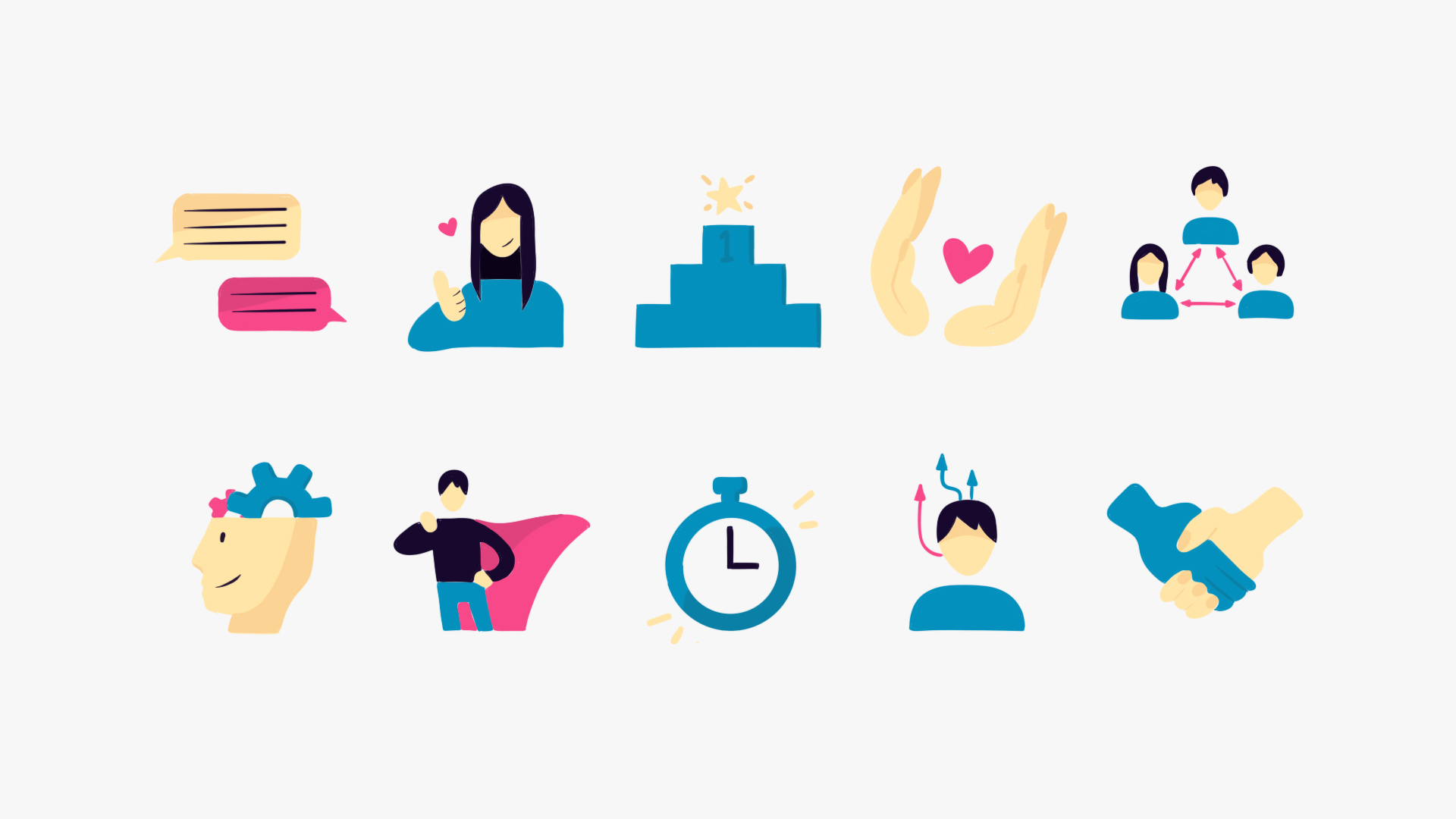SOFT SKILLS
What are soft skills?
Soft skills are the personality traits, behaviors and interpersonal skills that we use to interact with other people. In the workplace, they represent our ability to work effectively and harmoniously with others, and it’s for this reason they are exactly the type of skills that employers look for.

While traditional workplace skills in areas like business and management are important, soft skills, while often overlooked, are crucial to career progression. Soft skills are not usually tied to specific professions. They relate to our personalities and, although they are less tangible than hard skills, they can still be learned and developed.
Soft skills are essential when addressing complex business environments. While functional or technical expertise remain essential, they are no longer adequate to solve real problems. Leaders must first establish mutual trust by leveraging soft skills before delegating hard knowledge and providing access to vital information.
Professional skills have often been associated with hard skills, i.e. the technical and academic skills we learn at school. These skills are, of course, essential if you want to do a specific job in marketing or finance, such as drawing up a business plan, launching a market study or analyzing an income statement.
Unlike technical skills, soft skills are more universal and can be applied to different fields and professions. Soft skills encompass a wide range of competencies, including effective communication, problem-solving, critical thinking, collaboration, creativity, time management, flexibility, resilience, empathy and leadership, among others. These non-technical skills are often considered essential assets for success in the workplace.
Firstly, because they complement technical and academic skills. You may be an expert in your field, but if you can’t communicate effectively with colleagues, collaborate with other teams or solve problems creatively, your technical skills will be limited in scope.
Soft skills are increasingly sought after by employers. Employers are looking for candidates who can adapt quickly to change, work as part of a team, communicate clearly and innovate. Soft skills are solid indicators of a person’s ability to thrive in a dynamic, constantly evolving work environment.
More than 70% of potential employees and more than 80% of HR and talent search professionals believe soft skills are more important than hard skills when it comes to hiring the right person for the job or getting a job.
Effective communication under high stress, empathizing or encouraging a team member who might be struggling are examples of soft skills that carry the highest importance to any organization. Soft skills are also uniquely human. In a workplace and job market changing at high speed because of technological advancement, they are the type of skills that cannot, thus far, be replicated by artificial intelligence. This will only increase their importance in the future.
The success of individuals in their job positions cannot necessarily be predicted through academic qualifications, technical knowledge and intelligence tests, but rather through soft skills. A soft skill is an underlying characteristic of an individual that is causally related to effective or superior performance in a situation or job. Soft skills have four characteristics:
- They are qualities that the person possesses permanently.
- They are observable when the person performs a task or activity.
- They are directly related to success in job performance or other types of activities.
- They are generalizable to various activities.
Regardless of the job, employees need both hard and soft skills to succeed in today’s workplace. Hard skills and soft skills help define the strengths of individuals and teams as well as how projects get done. When making new hires, we typically have a good grasp on the skills we are looking for in candidates. However, we often focus heavily on the hard skills a candidate has and not as much on soft skills, even though well-rounded employees have both hard and soft skills. An employee with highly tuned technical skills will not necessarily be successful in a job unless they also possess people skills, or the ability work well within teams.
It’s often said that hard skills are about “know-how-to-do” (“savoir-faire”), while soft skills represent “know-how-to-be” (“savoir-être”).
Hard skills refer to specific, measurable knowledge in a given field. These are technical skills acquired through formal education, vocational training or practical experience. They are generally tangible and easy to assess. They are often quantifiable and can be proven by certifications, diplomas or measurable results. These skills are essential for carrying out specific tasks in a given field.
Hard skills are often the more tangible of the two types of skills. Think of hard skills as more quantifiable and binary. These are some examples of hard skills:
The ability to type a certain number of words per minute
Knowledge of a computer program or skills relating to IT support
Proficiency in a language
The ability to certify and run a machine or system that requires common training for operators
Data analysis
The ability to copywrite or edit documents
Soft skills, on the other hand, are non-technical competencies linked to our personality, social skills and emotional traits. They are harder to quantify because they are subjective and difficult to measure precisely. Hard skills are generally easier to acquire and demonstrate through specific training, while soft skills are harder to develop and often require continuous work on oneself.
Soft skills are the interpersonal abilities that employees bring to the role they are occupying. They are those intangible qualities that employers search for as they try to fill a position.
Soft skills are also more diverse than hard skills. Here are some examples:
- Effective communication skills.
- Expression of empathy for colleagues’ troubles and stress points.
- Self-awareness and the ability to “read the room”.
- Ability to work well in teams.
- Flexibility to pick up tasks and embrace changes in plans.
- Leadership qualities.
- Ability to manage time efficiently (e.g., meet deadlines and project targets ontime).
- A solid and consistent work ethic.
- Attention to detail.
Do you want to hold a certain position in your company in two years? Do you want to make a career shift and apply for new jobs? Do you want just to be a better professional? Assessing your skill gaps requires putting your skills on the table and use them in scenarios likely to occur. Only then you will discover what’s missing.
Developing soft skills is an ongoing process that requires commitment and practice. It is always possible to strengthen behavioral skills by using a combination of training, observation, active practice and reflection.
The first step in developing your soft skills is to assess yourself honestly. Identify your strengths and weaknesses in terms of behavioral skills. FutureSkills presents you real world situations where you can use your soft skills successfully, as well as those where you could improve them. This awareness will help you target the skills you want to develop.
FutureSkills puts yourself in situations where you can practice the behavioral skills you want to improve. It gives you opportunities to broaden your experience and develop those soft skills you do not have. It broadens your horizon, opens your mind and enables you to envision yourself working with different people, learning to collaborate, solving problems and developing different behavioral skills.
Organizations invest in executive development for their own long-term goals, but individuals do not necessarily remain with the employers who’ve paid for their training. The second is the gap between the skills that executive development programs build and those that firms require. Traditional providers bring deep expertise in teaching cognitive skills and measuring their development, but they are far less experienced in teaching people how use those cognitive skills in a real office environment. The third reason is the skills transfer gap. Simply put, few executives take what they learn in the classroom and apply it to their jobs.
One of the biggest complaints we hear about executive education is that the skills and capabilities developed don’t get applied on the job. Research done by cognitive, educational and applied psychologists dating back a century, along with more-recent work in the neuroscience of learning, reveals that the distance between where a skill is learned (the place of acquisition) and where it is applied (the place of application) greatly influences the probability that a student will put that skill into practice.
FutureSkills successfully merges the place of acquisition and the place of application by making you understand a certain situation and take action immediately. Imagine an operator of a certain machine in an industrial plant. The best way to teach this person how to operate the machine is to stand by the machine and show what needs to be done and what decisions have to be made. When you solve a situation in FutureSkills, you are in front of the machine making decisions. FutureSkills shows you what’s going on and how you should act if you want to develop a certain skill. New skills are more likely to be applied when the place of application is near the place of acquisition and when we wonder: Who else is involved? How are these behaviors related to the skill I want to develop? What am I using this skill for?
All of this happens when you simulate soft skills with 
The professional world is constantly changing, whether due to technological evolutions, job transformations or economic uncertainty. Soft skills are essential for us to be able to adapt to these changes. It is through people that change is enacted. In this sense, soft skills are at the heart of every organization and ensure that relations and exchanges between teams are smooth and effective.
Managers ensure that there is a strong link between the company’s operational teams and its senior executives. This intermediary role means that they must communicate clearly and seamlessly to uphold the quality of such exchanges. Managing people is the very essence of their role when leading a team. Managers therefore need to possess a certain number of behavioral skills. Hosting, bringing together and leading a team to success requires a proven ability to communicate, remarkable emotional and relational intelligence.
However, several studies have not only shown that managers are not always prepared for their role but that they often learn managerial skills as they go along.


How can managers support employees to develop their soft skills? There are lots of different ways to develop soft skills. Soft skills can be acquired at work, during unfamiliar situations, through personal endeavors, the company culture, training and even through other co-workers. Essentially, every professional (and personal) experience can help to strengthen behavioral skills.
How can you enhance employees’ soft skills? Soft skills are intrinsically linked to people. When it comes to improving soft skills, it’s a case of knowing your employees inside out as well as understanding how they act and behave within a team. It I also important to have a clear and thorough vision of the company’s challenges and objectives. From there, you can draw up a list, or framework, of the soft skills that are essential to strong performance.
The key is to add value to behavioral skills and meet the individual employee’s training needs as well as the organization’s needs as a whole. Teamwork, commitment, productivity, relationship building and even adaptability are often the most sought-after soft skills. Soft skills help employees to grow within their organization. By enhancing behavioral competencies, organizations can create a stimulating work environment, find ways to evolve and assure high-quality management.